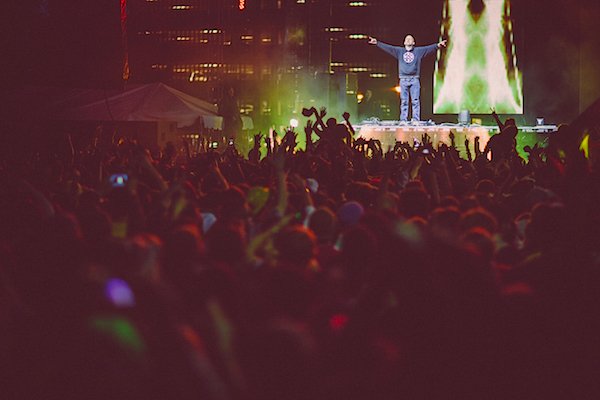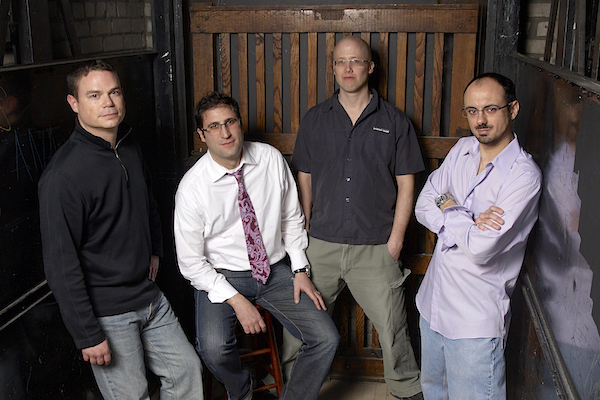Inside its new offices in Detroit's Corktown, the team from Paxahau is enjoying the relative calm before the storm. It's still weeks before
Movement, the electronic music festival the partners -- creative director Jason Clark, operations manager Sam Fotias, talent manager Chuck Flask, and Paxahau president Jason Huvaere -- have produced, promoted, bought local and international talent for, and managed on-site since 2006. And now is a good as time as any for them to reminisce about the 10 years they've spent managing it.
But before we begin, let's clear up some nagging proprietary business: Movement is not, as some still call it, the Detroit Electronic Music Festival or DEMF. The last one of those was in 2002, organized by an entirely different promotions group called Pop Culture Media, before it imploded under a series of missteps and internal squabbles (the most dramatic being the 2001
firing of artistic director Carl Craig, a divisive move that amounted to a declaration of cold war in Detroit's dance music community that remains chilly in spots today).
The Movement name first came along in 2003 with techno legend Derrick May, who became its primary steward for that year and the next, when the City of Detroit withdrew financial support for what was billed as one of the world's largest free music festivals. In 2005, May handed off leadership duties to fellow Belleville Three alum Kevin Saunderson, who rebranded it as Fuse-In and charged for the first time -- $10 per day, $25 for a weekend pass. But it, too, struggled and Saunderson bowed out in early 2006.
Detroit's Memorial Day weekend festival was under threat of disappearing for good until Paxahau took on the challenge of running 2006's festival, once again under the name Movement.
 Moby at Movement, 2013
Moby at Movement, 2013
Marriage of music and business
The prequel to the Movement festival story begins in 1994, when Fotias and Huvaere met at 1217 Griswold, a loft in pre-gentrified Capitol Park where a techno subculture was incubating. At the time, Fotias was working with Windsor's Richie Hawtin, whose
Plastikman alias was then blowing up worldwide.
Huvaere was living there and "throwing parties with other kids in the scene," according to Fotias. Clark began hanging out with Fotias and Huvaere in the late 1990s, and was part of the group when Paxahau officially launched its organization in 1998. Flask, who'd been going to parties at 1217 Griswold since the mid-90s, joined Paxahau in 2000. For the record, Clark, Fotias, and Huvaere are in their early 40s; Flask is in his late 30s.
The period between 1993 and 1998 was, says Huvaere, "an embryonic stage for Paxahau, a magical time. No one taught us how to do this, we just did it by following the bouncing tech ball into the future."
Paxahau soon became associated with the "second wave" of local techno artists that included Daniel Bell, Carl Craig, Hawtin, and his Canadian partner John Acquaviva.
"We came into the scene for the music," says Fotias. "Music drove the creativity of the business. We carry the same principles we had then with us today."
Paxahau saw the potential of music and business integration early on in its development as a company. It began archiving and streaming MP3s -- then a fledgling technology -- on its website 24 hours a day. The group did webcasts from a small Hamtramck bar (Cloud 9, now demolished), then began archiving live DJ sets at Motor, another larger Hamtramck venue that operated from 1996 to 2002.
 Movement afternoon crowd, 2015
Movement afternoon crowd, 2015
It was in 2002 that Paxahau left its first mark on the Memorial Day weekend festival when it organized a high-quality DEMF afterparty at the club Panacea (now 211 Ultra Lounge), featuring Hawtin and Berlin-based rising stars Ricardo Villalobos, Sammy Dee, and Zip, who co-owned the influential label Perlon. Around the same time, they brought Steve Bug from Hamburg to the Book Building and developed contacts with artists from the Kompakt label in Cologne.
By cultivating relationships with the best talent in Europe, Paxahau elevated its profile considerably. But the partners' early work came primarily from a place of admiration, not because it benefited their business. "We just wanted to remain humble ambassadors for what we believed in," says Fotias. "We were working day jobs, all hustling and scrapping to get by."
Taking the reins
In 2005, Saunderson asked Paxahau to program the Underground Stage at Fuse-In. The group did more than that, securing sponsorships from Sweden's Tronic imprint, Montreal's MUTEK festival, and Vitamin Water. Among the artists booked were Chilean-German producer/DJ Luciano, Akufen, Deadbeat, Jeff Samuel, and Vladislav Delay -- all on the cutting edge of techno at the time.
When the opportunity to take over the reins of the festival came in 2006, the group was ready. But they only had two months to prepare.
"It was intense," Fotias says, "we were going non-stop, sleeping on the floor."
"I started losing my hair that year," Flask says.
"Our families helped out; it was mostly just us," Fotias says. "We didn't know how many people would show up. On Monday night, the last night, we knew we would pay our bills."
 Paxahau 2006 (left to right): Jason Huvaere, Sam Fotias, Jason Clark, and Chuck Flask
Paxahau 2006 (left to right): Jason Huvaere, Sam Fotias, Jason Clark, and Chuck Flask
A reported 41,000 people attended Movement in 2006. That number has been steadily rising ever since and totals near or above 100,000 have been reported since 2011. There were four stages at the first festival that Paxahau produced. Now, 10 years later, there are six. The weekend is the centerpiece of what is now a weeklong celebration of related events, including a launch party for Berlin photographer Marie Staggat's book "313ONELOVE," and a discussion featuring techno originals
May, Saunderson, and Juan Atkins, both at MOCAD. The multitude of
afterparties are a major draw as well.
Huvaere says the group's greatest challenge has been adapting a business model meant for small events to a single, large event now staffed by hundreds featuring well over 100 artists.
"Staff design is vitally important," he says. "There are various production teams -- sound, lighting, staging -- food and beverage procurement, talent buying, and overall management."
But Huvaere says that an underlying "family" infrastructure is the most critical piece in an organization like Paxahau, and for an undertaking like Movement.
"We all made a life commitment to this music," he says. "We always knew there was never an option to quit what we were doing. Looking back, we see how hard it has been to make all this happen, but the passion is still there, the family is still growing."
Movement comes to Hart Plaza May 28-30. This year's lineup features Kraftwerk, Four Tet and Caribou making their festival debuts, as well as repeat performances by Carl Craig, Richie Hawtin, Kevin Saunderson and others. General admission tickets are $75 each day or $150 for a weekend pass. Get them here.
Walter Wasacz is a former managing editor of Model D and once authored a column on club culture for The Metro Times called The Subterraneans. He contributed an essay on Detroit techno for the recently published book 313ONELOVE.